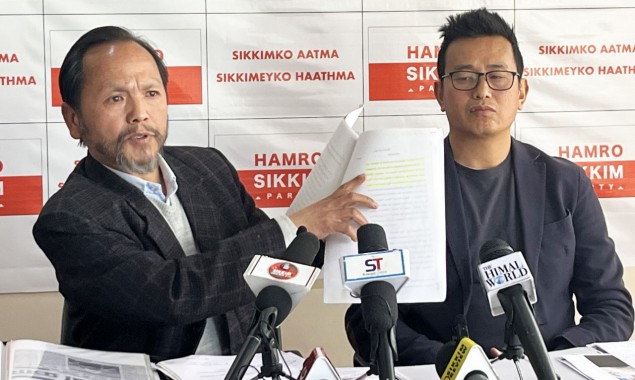




















Saturday, Jan 28, 2023 08:15 [IST]
Last Update: Saturday, Jan 28, 2023 02:43 [IST]
GANGTOK,: The recent Supreme Court verdict earlier this month, on tax exemption for old settlers and Sikkimese women married to non-locals, has been the talk of the State. Lately, the 'immigrant' tag on Sikkimese Nepali community in the court’s judgement has seen resignation by leaders to a call for 'Sikkim Ekta Rally' by Bhaichung Bhutia and his Hamro Sikkim Party (HSP) in February.
On Friday, the HSP president along with Sikkim Republican Party (SRP) president KB Rai objected to the 'immigrant' tag upon the Sikkimese Nepali community and posed questions to the State government.
In a joint press conference, Bhaichung questioned, “Why has the State government not appealed against the immigrant tag on Sikkimese Nepali community in the apex court’s verdict? The Advocate General of the State government can appeal for the removal of the line. Perhaps the Advocate General only takes stand after the approval from the Chief Minister. The government has a responsibility to take up the issue and they can appeal. It might be a passing remark that is given; we are not saying to change the verdict but just change and object on the term and tag used. It's a wrong tag being laid upon Nepali community.”
SRP president KB Rai contended that the 'immigrant' tag has been mentioned more than once on Supreme Court verdict, taking example of a similar case in the past.
“The need is for anthropological research and history to be presented at a national stage on what identity does the Sikkimese Nepali hold. Immigrant very simply means not originally from here. In 1979, late Nar Bahadur Bhandari (former Chief Minister) had contended how can a Nepali become a Chief Minister of State if he is an immigrant. Another part of history in 1991 suggests how former Nepal Prime Minister Girija Prasad Koirala termed Bhandari as Indian and not Nepali. Despite being recognised as citizen of India, Sikkimese Nepalis are being termed with immigrant and influx tag. Nepali community in Sikkim is also termed as later immigrants from Nepal. Original inhabitants are Bhutia and Lepcha and those that came from Nepal, says our history. For some years we may use the privileges and rights of the State but maybe not the future generations,” said Rai.
The SRP have for long raised a voice in demand for Nepali seat restoration in the Assembly and has allied with the HSP to pursue the restoration.
Rai said, “This is the reason that HSP and SRP joined hands in a greater fight for Nepali seat and fighting against immigrant tag. Government must have the political will power to pursue the Nepali seat restoration. The government cannot go Supreme Court to change this, but make use of anthropology and history to change the immigrant tag and bring out a notification. If it does, this can change the immigrant tag on Sikkimese Nepali community.”
Bhaichung suggested how MPs on a pan India level can be approached for restoration of Nepali seat in Sikkim Legislative Assembly. He said, “First we must be sure if Government of India wants to implement Nepali seat reservation. We have to convince them that it existed before. All communities must get their rights. The key to how it is done is with the government. Political reforms and solutions are mentioned in manifesto but after winning such issues are forgotten. We have to be family collectively else future generations will face trouble of identity. When we form the government we will come with the formula. Right now we don’t have the key.”
